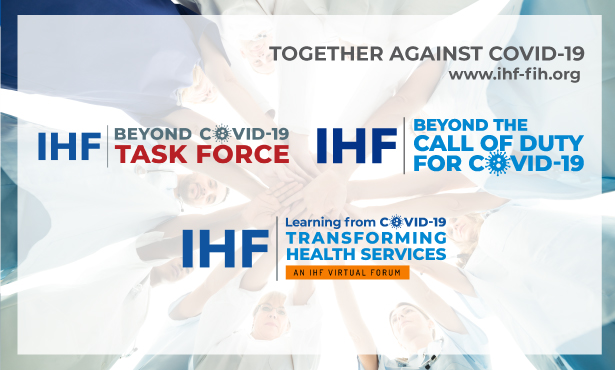5 Questions to … Eric de Roodenbeke

Hospitals have been at the forefront in fighting the COVID-19 pandemic. We sat down with Eric de Roodenbeke, CEO of the International Hospital Federation to talk about how hospitals have adapted to the new normal as we continue to grapple with the pandemic.
5 Questions to … Eric de Roodenbeke
The IHF has celebrated its 90th anniversary in 2019, would you have imagined that just a few months later hospitals would be in the forefront in fighting a pandemic?
When reflecting on health service providers priorities at the end of 2019, there was very limited interest on the role of hospitals in the fight against communicable diseases. After the massive mobilization against AIDS, the attention has shifted to non-communicable diseases and ageing population as well as making sure that health services are providing value for money and paid accordingly. All this now seems trivial with the global mobilization against COVID.
Most countries, especially in the Global North, were not prepared to face COVID. In the initial stages of the pandemic, most hospitals were fully mobilized to respond to COVID patients and in several countries the lack of intensive care beds, medical devices and supplies (especially personal protective equipment for health workers) made headlines but at the same time a large part of hospital capacities and activities were frozen because of lockdown measures and/or patients were afraid to come to the hospitals.
Can you be more specific about how health services are impacted by COVID?
The health status of the populations has not changed because of COVID and chronic conditions for middle and high-income countries demands the majority of need for health care. Hospitals have therefore had to adapt to respond to the health needs of all these patients but with an additional layer of measures for infection control that is creating severe constrains for delivering care. Putting in place physical distancing in all its forms takes more time and requires more space and equipment. In other words, the productivity of health services is significantly impeded by COVID for all conditions considering that anyone can have COVID while seeking help for any other health condition.
The mobilization of health workers to respond to the crisis was remarkable, however it is understandable that after the pandemic there will be a need for personal and psychological recovery and for moving from crisis response mobilization to a new routine. This is part of the challenge health services are currently facing with high uncertainty on whether to put in place an organization that is for mitigating the consequence of COVID or if we need to transform all practices for the long term. The paradigm shift will happen if we cannot win the fight against COVID and have to live with COVID for years to come. Currently the dominant approach is driven by the idea that we will eventually win the fight against COVID especially with immunization.
With COVID a lot of innovation have been put forward, do you believe that they will transform healthcare provision?
The agility of hospitals and their capacity to innovate has been praised. The idea that we have to live with COVID-19 also draws a lot of attention to getting ready for the “next normal” or the “new normal”. At IHF, we have quickly responded to the COVID situation in line with our mission to share best practices and knowledge leading to action. We organized webinars for hospital leaders to share how they have organized response to the crisis and put in place continuity of care.
Additionally, the IHF has created the ‘Beyond COVID-19’ Task Force to reflect and recognize these innovations and to ensure that we contribute to sustain those that are working towards performance improvement. This task force is multinational and multisectoral and this should provide robust recommendation beyond just what could be described as local adaptation to face a crisis. Task force members have identified key domains where COVID has contributed to transformations that will be part of tomorrow’s regular practice regardless of the evolution of the pandemic. What’s interesting about this approach is it considers contributions that accelerate existing trends for evolution and innovations that will transform practices.
You mentioned how hospitals have been praised, is this making a difference to the future of hospitals?
We hope that the public health agenda will take hospitals into consideration for the health and wellbeing of a population. To give credit to the WHO, the Astana Declaration on Primary Health Care (PHC) has brought forward a renewed vision on PHC that has made more room for all providers including hospitals to unite in a single effort to achieve Better Health to All under Universal Health Coverage. Hospitals are hubs for supporting the care of the population in coordination with other providers. In many countries, hospitals are part of the greater health system and are no longer stand-alone facilities delivering services inside their walls. This is a heavy trend and COVID won’t change that.
As previously mentioned, the lack of intensive care beds has become a political debate beyond what is rational. Governments may have focused too much on beds as a unit for health service planning while the focus should be on capacity to treat health conditions leaving more flexibility for hospitals and their internal organizations; avoiding the use of beds as a key indicator.
COVID has demonstrated how flexibility and responsiveness is important. The IHF is collecting stories; calling all facilities that have created unique and exemplary actions or responses to share them and be recognized at the Beyond the Call of Duty for COVID-19.
As an international NGO did COVID change the course of your activities?
Like all organizations, we had to take the pandemic into account and develop new programs in response to the situation, and to put on hold a number of our activities. IHF has developed a full portfolio of COVID related activities such as; a database of information in relation to COVID-19, podcasts for experience sharing, specific e-newsletters, social media posting and dedicated blogs. Instead of switching our global congress from face-to-face to virtual, the IHF board has decided to fully postpone the World Hospital Congress to next year and to organize a fully dedicated IHF Virtual Forum: Learning from COVD, Transforming Health Services.
Author





